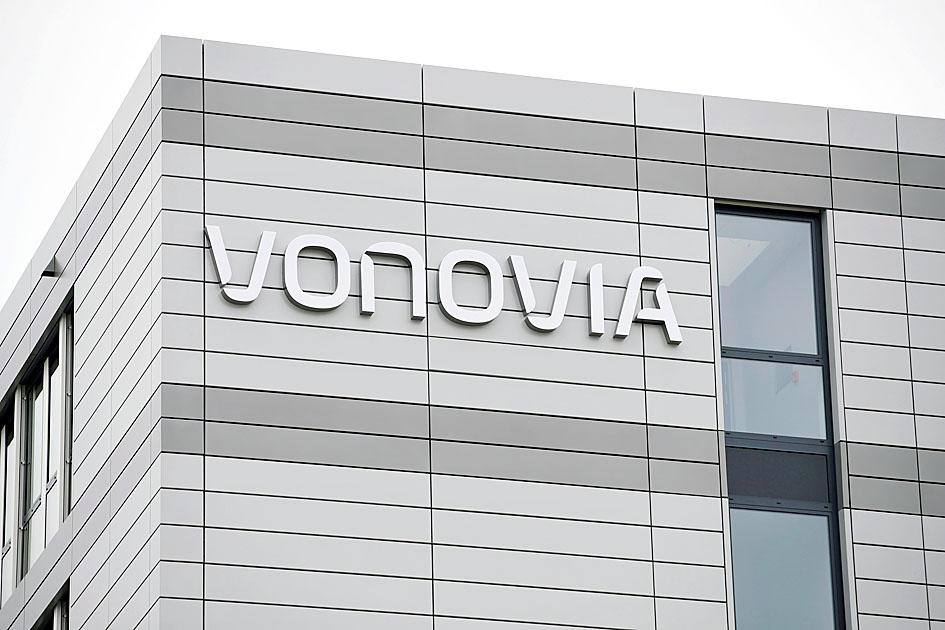German residential property firm Vonovia SE has agreed to acquire rival Deutsche Wohnen SE for about 19 billion euros (US$23 billion) in the biggest-ever takeover in European real estate, a deal that risks further stoking tensions over affordable housing.
The takeover, the year’s biggest in Europe, would reshape Germany’s property industry. The country’s two largest residential landlords control more than 500,000 apartments and risk raising further concerns about the market power of big property owners.
German landlords have faced intense public pressure over the past few years over rising prices, particularly in Berlin. Activists in the nation’s capital have targeted Deutsche Wohnen in particular with a referendum that is seeking to force the city to buy out large apartment owners.

Photo: Reuters
Amid concerns over housing and tensions over the companies’ large holdings in Berlin, the deal is an effort at a “new beginning,” Vonovia chief executive officer Rolf Buch said on a conference call yesterday.
He said that he would speak with Berlin Mayor Michael Mueller later in the day to discuss the deal.
The combined company plans to offer to sell about 20,000 apartments to the city, a presentation showed.
Under the deal, Vonovia would offer 53.03 euros per share in cash for each Deutsche Wohnen share, including a proposed dividend, the companies said in a statement late on Monday.
The bid represents about an 18 percent premium to Deutsche Wohnen’s closing price on Friday last week.
The stock jumped as much as 16 percent to 52.38 euros yesterday. Vonovia’s shares fell as much as 6.8 percent to 48.57 euros.
Vonovia is planning a rights issue of as much as 8 billion euros after the completion of the transaction, expected in the second half of the year. The companies anticipate 105 million euros in cost savings a year from the joint management of their portfolios.
Deutsche Wohnen chief executive officer Michael Zahn and chief financial officer Philip Grosse are expected to be named to Vonovia’s management board after the acquisition, the companies said.
A takeover of Deutsche Wohnen would mark the crowning achievement for serial dealmaker Buch. He built Bochum-based Vonovia into a European property heavyweight through several acquisitions, including the 2019 purchase of Swedish landlord Hembla AB and a 2016 deal for Austrian developer Conwert Immobilien Invest SE.

KEEPING UP: The acquisition of a cleanroom in Taiwan would enable Micron to increase production in a market where demand continues to outpace supply, a Micron official said Micron Technology Inc has signed a letter of intent to buy a fabrication site in Taiwan from Powerchip Semiconductor Manufacturing Corp (力積電) for US$1.8 billion to expand its production of memory chips. Micron would take control of the P5 site in Miaoli County’s Tongluo Township (銅鑼) and plans to ramp up DRAM production in phases after the transaction closes in the second quarter, the company said in a statement on Saturday. The acquisition includes an existing 12 inch fab cleanroom of 27,871m2 and would further position Micron to address growing global demand for memory solutions, the company said. Micron expects the transaction to

Vincent Wei led fellow Singaporean farmers around an empty Malaysian plot, laying out plans for a greenhouse and rows of leafy vegetables. What he pitched was not just space for crops, but a lifeline for growers struggling to make ends meet in a city-state with high prices and little vacant land. The future agriculture hub is part of a joint special economic zone launched last year by the two neighbors, expected to cost US$123 million and produce 10,000 tonnes of fresh produce annually. It is attracting Singaporean farmers with promises of cheaper land, labor and energy just over the border.

US actor Matthew McConaughey has filed recordings of his image and voice with US patent authorities to protect them from unauthorized usage by artificial intelligence (AI) platforms, a representative said earlier this week. Several video clips and audio recordings were registered by the commercial arm of the Just Keep Livin’ Foundation, a non-profit created by the Oscar-winning actor and his wife, Camila, according to the US Patent and Trademark Office database. Many artists are increasingly concerned about the uncontrolled use of their image via generative AI since the rollout of ChatGPT and other AI-powered tools. Several US states have adopted

A proposed billionaires’ tax in California has ignited a political uproar in Silicon Valley, with tech titans threatening to leave the state while California Governor Gavin Newsom of the Democratic Party maneuvers to defeat a levy that he fears would lead to an exodus of wealth. A technology mecca, California has more billionaires than any other US state — a few hundred, by some estimates. About half its personal income tax revenue, a financial backbone in the nearly US$350 billion budget, comes from the top 1 percent of earners. A large healthcare union is attempting to place a proposal before